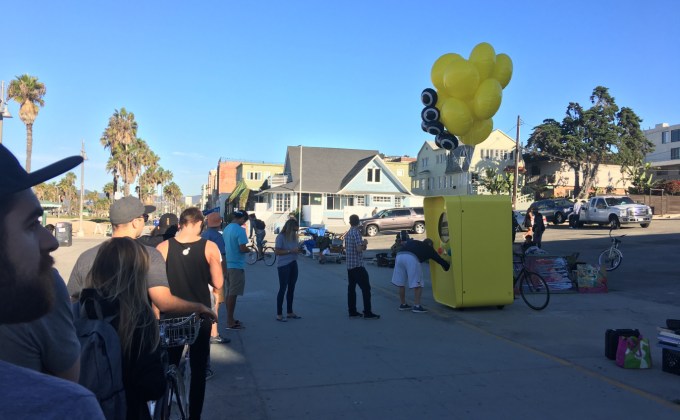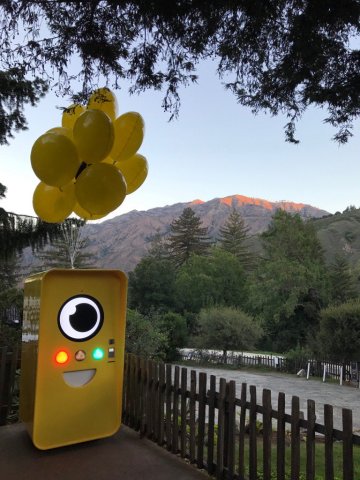Some of Google's unwitting users are learning a harsh lesson: If you violate the company's policies, it can abruptly cut you off from your Gmail account, online photos and other vital digital services.Several people who recently bought Google's new Pixel phone on behalf of a New Hampshire dealer are now suffering that punishment after the company detected their online purchases and judged they violated its terms of service. Those rules, outlined in a document that few people read closely , forbid the purchase of the Pixel for "commercial" resale.
"There isn't an hour that doesn't go by that I don't think about the enormity of what Google has done to me," said one of the affected resellers, Shmuel Super of Brooklyn, New York. "This is like a digital death sentence."
Sell Your Phone, Lose Your Account
Super and his fellow resellers got into trouble for buying up to five Pixel phones from Google's online store and having them delivered to New Hampshire for resale. They received $5 for each phone. As of Sunday, some started finding themselves locked out of their Google accounts.
In a Thursday statement, Google described the resale arrangement as a "scheme" devised by a dealer looking to sell the Pixels at marked-up prices in violation of its policies.
Google declined to say how many people were affected by the account lockdown. DansDeals , a consumer-focused website that first reported Google's crackdown, concluded that more than 200 people had been blocked from their Google accounts after talking to the New Hampshire dealer behind the Pixel buying spree. The Associated Press was unsuccessful in its efforts to identify and interview the dealer.
The crackdown may come as a surprise to the hundreds of millions of people who now routinely rely on Google, Facebook, Apple and other tech companies as the caretakers of their digital lives. Few of the people involved in this situation appear to have backed up their data outside of Google.
Google said it plans to restore the accounts of customers who it believes were unaware of the rules, although the company didn't specify how long that might take.
Living Without Google
Once they figured out why they were being locked out, the exiled consumers realized how dependent they had become on Google as the custodian of their digital communications, records and other mementoes.
Some said they couldn't retrieve confirmation numbers for upcoming flights or notices about an upcoming credit-card payment. Others couldn't fetch work documents or medical records. Some started getting phone calls from friends, family and colleagues wondering why they weren't responding to emails.
Like two other people interviewed by the AP, Super said he had no idea that he was violating Google's policies when he bought the Pixels for the New Hampshire dealer. He can't believe Google would do something as extreme as locking him out of his account without warning, rather than just banning him from buying its phones in the future.
"Google's slogan is 'Don't be evil,' but to me, there is nothing more evil that what Google has done here," Super said.
Crime and Punishment
Some of the Pixels purchased for resale were delivered before Google recognized the violations and meted out a punishment spelled out in a separate terms-of-service document . "We may suspend or stop providing our services to you if you do not comply with our terms or policies or if we are investigating suspected misconduct," Google warns in one section.
Google doesn't give any advance notice before it shuts down an account, and doesn't make distinctions between minor and major violations. Affected users can appeal for reinstatement, though it's unclear how long that might take or what criteria Google uses in such cases.
Apple also forbids online purchases of iPhones for resale, although its terms of service say only that the company reserves the right to cancel any order suspected of breaking the rule.
Daniel Levy, who has been locked out from his Google account since Monday, said he has learned a hard lesson, though not necessarily the one the company intended.
"They confiscated my property and shouldn't be trusted," said Levy, who lives in Lakewood, New Jersey. "I will never use their services again."
Technology Hot News Spot
Showing posts with label usa. Show all posts
Showing posts with label usa. Show all posts
Monday, November 21, 2016
Wednesday, November 16, 2016
Technology News - This is why Snapchat didn’t give Spectacles to techies

If you want to make something cool, don’t give it to geeks first. Google Glass learned that the hard way.
Despite Snapchat’s best efforts, Robert Scoble still got a hold of a pair of the Spectacles camera glasses. He’s the enthusiastic tech blogger above who shot a nude selfie wearing Google Glass in the shower that came to embody the gadget’s cursed brand. He even admits to me that it was smart that Snap Inc didn’t send him a pair.
A SpectaScobles selfie was the exact opposite of Snapchat’s plan. That’s why it didn’t deliver any review units of Spectacles to bloggers, or send them to tech celebrities who usually get early beta access to new products.
If it did, that would have forged a perception of Spectacles as a serious device meant to be painstakingly reviewed instead of casually played with as they should be. And it would have positioned them for serious adults and early adopters, instead of the typical teens that make up Snapchat’s core user base.

So instead, it suddenly dropped a goofy vending machine full of Spectacles on a beach boardwalk in LA, near a national park in Big Sur, California, and a roadside tourist trap off Route 61 near Tulsa, Oklahoma. Snapchat lovers scrambled to get there quick and stand in long lines in hopes of scoring a pair.
There are several reasons this was brilliant:

Artificial Scarcity – People love exclusivity, but with an air of egalitarianism. By not openly selling them online or in a permanent brick-and-mortar store, and instead making their availability extremely limited, somewhat random, and only for those willing to stand in line, their perceived value skyrocketed. Sure, people are selling them on eBay for huge markups at $800 to $2000 dollars. But the point was anyone with $130 and some luck could don the glasses.
Geographic Clustering – Snapchat itself blew up in LA high schools, becoming a hit with a densely interconnected group of teens long before the press picked up on the phenomenon. Facebook actually started quite similarly, only being available at a few elite colleges like Harvard, Columbia, and Stanford. Spectacles were also launched like this. Beyond making everyone else a bit jealous, it limited the chance of someone being the only person in their area using the product. For Snapchat and Facebook, that meant people actually had friends to use the app with. And for Spectacles, it means there will still be hype left to exploit when they hit the east coast and abroad.
Buying As An Experience – When was the last time the acquisition of a product felt as momentous as owning the product itself, and that moment wasn’t annoying? Sure lots of people stayed up late to order their Apple Watch and tweet what configuration they got, though I wouldn’t call that fun. People got excited about their place in the waitlist to use the Mailbox email app, yet the eventual rollout was anti-climactic. But the googly-eyed Snapbot vending machine, dropped in scenic locations, with an augmented reality try-on screen, got almost as much coverage as the videos you make with Spectacles.
Snapchat isn’t the only one realizing big, flashy press conferences and early access for journalists aren’t the only way to release a product.
Facebook cut back on glitzy launch events following one it threw for Facebook Home, which immediately flopped. And after Sean Parker’s video app Airtime bumbled its 2012 launch extravaganza with broken demos featuring celebrities like Jim Carrey, its 2016 relaunch had no event attached.
And poor Google Glass. It tried to normalize wearing a computer on your face by handing it to the least fashionable people around, bloggers and app makers. It needed people to look cool wearing it, or at least not super weird, before anyone cared what the reviews said and the apps did. That’s why the first memorable photos of Spectacles weren’t shot by Scoble, but by famous fashion photographer Karl Lagerfeld.
Scoble concludes that the Spectacles Snapbots “make a lot more sense than the way Google rolled out Google Glass to developers and nerds.”
Labels:
2016,
2017,
android app,
Anti-smartphone,
App,
Apps,
Snapchat,
social network,
Spectacles,
techies,
technology,
tips,
tricks,
uk,
us,
usa
Monday, November 7, 2016
Did You Know Why Are Samsung's Galaxy Note 7 Phones Exploding?

Samsung was forced earlier this week to discontinue its
flagship Galaxy Note 7 smartphone. For good. The Galaxy Note 7 turned
out to be a massive disappointment. The phone intended to fight the
iPhone 7 Plus this year was seen as one of the hottest Android devices
in town. Unfortunately, it also turned out to come with an unexpected
side-effect: the Galaxy Note 7 is a fire hazard. Even after Samsung
fixed it.
New manufacturing issues
Samsung has yet to explain what went wrong with its batteries in both
the original phones and the replacements. The Consumer Product Safety
Commission (CPSC), which worked with Samsung on the US recall, said on
September 15th that batteries made by Samsung SDI were faulty.
Apparently, they were made slightly too large for the space available in
the phone. Installing them would crimp the corner, which could lead to a
short circuit, overheating and potentially a fire.
Samsung removed Samsung SDI batteries from its Galaxy Note 7 supply and turned to China’s Amperex Technology. However, Bloomberg reports
that even Amperex batteries proved to have a manufacturing
problem. Investigators of the latest Galaxy Note 7 incidents believe
that a flaw different from the one that caused the original recall is to
blame, according to Bloomberg.
The new issue hasn’t been explained, but it looks like it may have
crept into the supply chain after Samsung began replacing the faulty
phones. Samsung had no choice but to pull the plug. Neither Samsung nor
Amperex’s parent company TDK Corp. commented on the matter, Bloomberg says.
More disturbingly, Samsung is apparently leaving its carrier partners
in the dark about the problem. Samsung is asking partners to share
testing data, but Samsung isn’t reciprocating. Carriers have no idea
what to tell customers, one unnamed carrier executive said.
Fast charging
Another theory that tries to explain the numerous Galaxy Note 7
explosions has to do with the fast-charging feature of the battery.
According to the Financial Times, the problem comes from tweaks made to the processor to speed up charging.
“If you try to charge the battery too quickly it can make it more
volatile. If you push an engine too hard, it will explode. Something had
to give. These devices are miracles of technology — how much we can get
out of that tiny piece of lithium-ion,” an unnamed source said after
supposedly speaking with Samsung executives about the matter.
That beautiful design
The Galaxy Note 7’s looks might actually lead to explosions.
Specifically, it’s the symmetrical curvature of the phone, a feature
Samsung bragged about, that may have exerted pressure on battery packs
and caused the short circuits that eventually led to dangerous fires.
After the first recall, leaked documentation from the Korean consumer
protection agency said that Samsung SDI’s batteries were slightly
larger than the compartment they were supposed to be placed in.
Furthermore, the isolation plates that separate the anode and cathode
were too close to the edges.
One theory states that external pressure could have been applied to
those isolation plates during manufacturing. The plates are placed
towards the edge of the battery and when the phone is sealed, the
battery pack might be subjected to excessive pressure. The images below
show SDI battery packs with isolation plates placed too close to the
edge.
Labels:
best smartphone,
electronics,
fire,
galaxy,
galaxy note 7,
issue,
korean,
latest,
launch,
news,
problems,
samsung,
samsung exploded,
technology,
tips,
tricks,
us,
usa
Samsung to hobble Galaxy Note 7 charging in US with software
Most Galaxy Note 7 users in the US have returned their
devices. For those who haven't, Samsung will soon start limiting the
device's charging capabilities.
Samsung on Friday said 85 percent of all recalled Note 7 phones in the US have been replaced
through its refund and exchange program, "with the majority of the
participants opting to receive another Samsung smartphone." The company
didn't immediately provide information about how many phones had been
returned around the world.
For
the remaining holdouts in the US, Samsung said it will release a
software update in the coming days to limit the phone's ability to
charge beyond 60 percent. It also will issue a reminder pop-up
notification every time a consumer charges, reboots or turns on the
screen of their Note 7 device.
"We remain focused on
collecting the outstanding Galaxy Note 7 phones in the market," the
company said in a statement on its website.
Even though people have been warned to stop using their phones, some super fans have continued to hold on to their Note 7 devices.
Along with issuing the charging limitation software in other markets,
Samsung has taken more drastic measures to get people to turn in their
devices. Earlier Friday, the company said it had teamed up with carriers
in New Zealand to cut off access to wireless networks for customers still using their Note 7 devices.
Samsung hasn't yet gone that far in the US or other major markets.
The
Note 7, which hit the market in mid-August, was expected to solidify
Samsung's lead in the mobile market after a strong showing with its
Galaxy S7. The company had just begun to regain its swagger after
stumbling the previous year with lackluster products.
Then came the battery problems, which caused some units to overheat and catch fire. Samsung issued a global recall
of the popular device in September. But then some replacement units
started having the same problem. That caused Samsung to issue a second recall in mid-October and permanently stop production of the device. It's offering Note 7 owners $100 to exchange the device for another Samsung phone.
Samsung has said the Note 7 recall will cost it more than $5 billion over the next few quarters. The company on Friday also issued a recall for 2.8 million washing machines
due to injury risk. The two fiascos have raised questions about
Samsung's quality and assurance testing and have dealt a blow to its
reputation.
Labels:
2016,
2017,
24-inch display,
america,
android,
android app,
App,
application,
best smartphone,
charger,
dispay,
electronics,
galaxy,
galaxy note 7,
products,
sales,
samsung,
smartphone,
usa
Subscribe to:
Comments (Atom)



